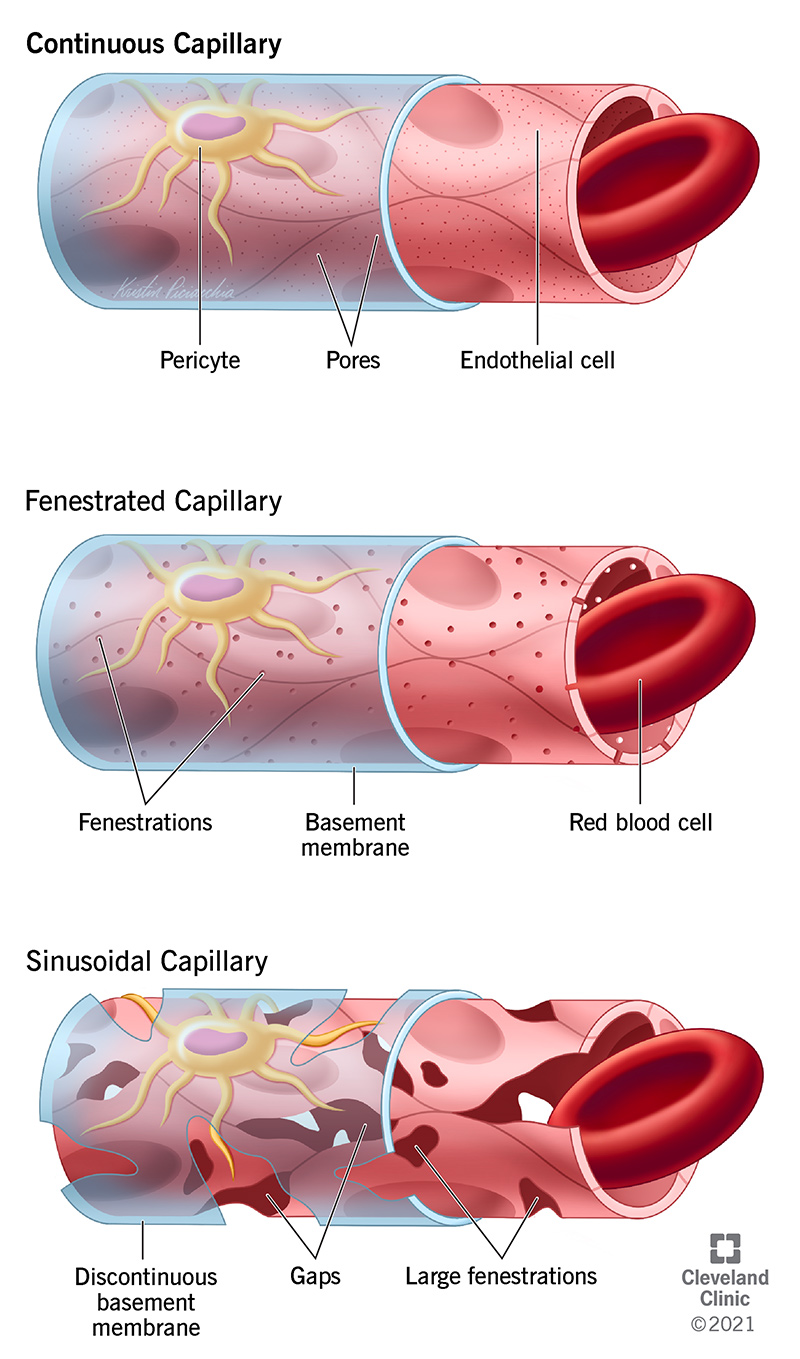Which is a Characteristic of Continuous Capillaries
Continuous Capillaries
Continuous capillaries are the smallest blood vessels in your vascular system. They connect your arteries to your veins. They also support your brain, endocrine system, kidneys, lungs and small intestines. Both genetic and nongenetic conditions can affect continuous capillaries. Lifestyle changes may help maintain the health of your capillaries.
Overview

What are continuous capillaries?
Capillaries (CAP-uh-lair-eez) are tiny blood vessels that transport blood, nutrients and oxygen to cells in your organs and body systems. Capillaries are the smallest blood vessels in your vascular (blood vessel) system.
Continuous capillaries are the most common type of capillary in your body. Like other blood vessels, they have a lining made up of a type of cell called endothelial cells. They are called continuous because these cells sit close together, one after the other.
What are the types of continuous capillaries?
There are two types of continuous capillaries:
- Continuous nonfenestrated capillaries have a lining that contains pores (also called intracellular clefts) that let only small molecules pass through. These molecules include water, glucose, hormones and gases. This type of capillary exists in your nervous system, skin and lungs.
- Continuous fenestrated capillaries have larger openings (fenestrations) between the cells that allow the quick exchange of substances. These substances include nutrients and blood. This type of capillary is in your kidneys, small intestine and endocrine glands.
A third type of capillaries, sinusoidal capillaries, is discontinuous. These capillaries have even larger gaps and pores. Sinusoidal capillaries are in your liver, spleen, lymph nodes, bone marrow and endocrine glands.
Function
What do continuous capillaries do?
Continuous capillaries connect arteries to veins in your circulatory system. They are an important part of how blood flows through your body. The continuous capillaries help your body move substances into and out of your bloodstream to and from organs. The:
- Arteries transport oxygen-rich blood from your heart to your organs.
- Veins help your body get rid of low-oxygen blood and waste.
How do continuous capillaries help support other organs?
Continuous capillaries are important to several organs and body systems. They support your:
- Brain, by forming the blood-brain barrier.
- Endocrine system , by delivering hormones to specific organs.
- Kidneys, where peritubular capillaries filter blood, create urine and absorb sodium and water.
- Lungs , by getting rid of carbon dioxide and taking in oxygen.
- Small intestine, by helping transport digested nutrients to nourish your cells.
What is the role of capillaries in the blood-brain barrier?
Continuous nonfenestrated capillaries make up your blood-brain barrier. Here, capillaries control the movement of water, oxygen and other essential substances between your blood and your brain. They prevent toxins from entering your brain, protecting it from injury and disease.
Anatomy
What is the structure of continuous capillaries?
Continuous capillaries are only about 8 to 10 micrometers in diameter (a micrometer is 0.001 mm). That's about four ten-thousandths of one inch, or the width of a single cotton fiber. Red blood cells have to pass through continuous capillaries in a single-file line.
Continuous capillaries consist of:
- Endothelial cells that line the capillary walls.
- Basement membrane, a continuous layer of cell tissue that supports the endothelial cells.
- Pericytes, cells that dot the outside of capillary walls and can contract to restrict blood flow.
Conditions and Disorders
What genetic conditions affect continuous capillaries?
Conditions that affect continuous capillaries may be genetic (hereditary). These conditions include:
- Arteriovenous malformation (AVM) : A tangle of arteries and veins in the brain or spinal cord that may bypass the capillaries.
- Capillary angiosarcoma: Cancer of the endothelial cells that can affect the capillaries.
- Hereditary hemorrhagic telangiectasia (Osler-Weber-Rendu syndrome): An inherited blood vessel disorder that causes abnormal growths (telangiectases), which can burst.
- Macular degeneration : Damage to the inner eye due to capillary leaks.
- Microcephaly -capillary malformation syndrome: Causes wide capillaries in people with abnormally small heads due to a congenital (present at birth) condition or injury as a baby.
What nongenetic conditions affect continuous capillaries?
Nonhereditary conditions that may affect continuous capillaries include:
- Broken capillaries: Damage to tiny blood vessels under the skin, sometimes due to coughing or vomiting.
- Capillary leak syndrome: Causes a sudden drop in blood pressure and sometimes requires emergency treatment.
- Spider nevus (spider angioma or spider telangiectasia): Small blood vessels that branch from a central spot, usually on the face, neck or chest.
- Strawberry hemangiomas : Bright red clusters of blood vessels on the surface of the skin.
- Vasculitis : Blood vessel inflammation that can affect the capillaries and cause complications such as rupture and blockages.
Can problems with continuous capillaries lead to other diseases or conditions?
Scientists are studying whether continuous capillary dysfunction may play a part in:
- Alzheimer's disease.
- Stroke.
- Vascular dementia.
Care
How do I care for my continuous capillaries?
You can take care of your capillaries by:
- Choosing to quit smoking or using tobacco products.
- Living an active lifestyle.
- Maintaining a healthy weight.
- Watching your alcohol consumption.
You can also work with your healthcare provider to manage conditions that can affect your vascular health. These conditions include:
- Diabetes.
- High blood pressure.
- High cholesterol.
- Stress.
Frequently Asked Questions
How do I protect my face from broken capillaries?
You can prevent damage to the capillaries under your skin by:
- Reducing your alcohol consumption.
- Stopping smoking.
- Treating underlying conditions, such as rosacea.
- Using a broad-spectrum UVA and UVB sunscreen.
- Washing your face gently rather than vigorously.
A note from Cleveland Clinic
Continuous capillaries are tiny blood vessels that deliver blood, nutrients and oxygen to your cells. Two types, continuous fenestrated capillaries and continuous nonfenestrated capillaries, have different purposes. Many genetic and nongenetic conditions may affect your continuous capillaries.
Source: https://my.clevelandclinic.org/health/body/21788-continuous-capillaries

0 Response to "Which is a Characteristic of Continuous Capillaries"
Post a Comment